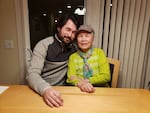Less than 24 hours after Ki Soon Hyun moved into a state-certified assisted living facility in Sandy, Oregon, the beloved mother and grandmother’s lifeless, frozen body was found outside less than a half a mile away from her new bed.
Her death was a tragedy. And yet, another calamity was slowly unfolding for the remaining residents of Mt. Hood Senior Living.
After Hyun wandered away from the facility and died of hypothermia, nobody from the state’s licensing team immediately visited the facility. Finally, after 28 days, they went to inspect in light of Hyun’s death. When they did, a litany of concerns prompted them to immediately shutter the facility. They moved 13 of the remaining residents to other facilities ill-equipped to care for them late on a dark, rainy night.
Hyun’s death and the state’s poor treatment of the remaining vulnerable residents at Mt. Hood Senior Living has highlighted systemic failures in how the state cares for vulnerable adults. This week a legislative panel heard painful testimony from Hyun’s family and others who had loved ones at the Mt. Hood Senior Living facility.

Ki Soon “Harmony” Hyun, right, with her grandson Porter Lane, at her daughter’s home, in an undated photo provided by family. Hyun, 83, who had dementia, died after wandering from the Mt. Hood Senior Living care facility in Sandy, in December 2023, after the staff failed to lock and secure the doors.
Courtesy of family
The state’s long-term care ombudsman Fred Steele has called for an independent audit into the division at the state’s human services agency that oversees and regulates long-term care facilities. But Steele also has a more dramatic suggestion: He is calling on lawmakers to consider wholesale bureaucratic changes to prohibit the same agency from licensing and regulating how Oregon’s long-term care providers care for the state’s most vulnerable aging adults.
“It’s the consumer protection function of licensing and regulations that is being lost,” Steele said.
Sen. Sara Gelser Blouin, D-Corvallis, who chairs the Committee on Human Services, said there are broader questions in how to ensure state agencies are actually protecting the residents of the state, noting there have been similar issues arise in both kids and adults in foster care.
The way our state is structured, she said, the Department of Justice is essentially serving as a “liability protection firm for state agencies rather than as advocates for the people of Oregon.”
One of those residents moved in the dark of night in January from Mt. Hood Senior Living was Bonnie Everett. She was moved at 11 p.m. to a place that her niece said was not equipped to support a person with dementia, which Everett has. The family only had a few hours notice that Everett was being moved and they had a hard time getting information on how she was doing or where she was located. They contacted the personnel reportedly overseeing the resident’s move at the state’s Department of Human Service office and got an out-of-office message.
“I spent the entire weekend searching for her,” Everett’s niece, Melissa Fisher testified to a panel of lawmakers this week. Fisher said the state moved the residents as if they were cattle, not humans.
“They did not have a comprehensive, person-centered and dementia-centered plan created by the Oregon Department of Human Services,” she said. “... It is as if no one who made this decision had any knowledge about the needs of those with dementia.”
Leading up to Hyun’s death, ODHS licensing staff were informed that the facility was both regularly understaffed and also without an administrator. The interim administrator emailed state licensing officials telling them she didn’t feel qualified for the job.
“I do not believe I have the credentials, training, or education to fill in as an interim, as I have only been a bookkeeper/Business Office Manager with a High School Diploma; no college education or formal medical training or work experience,” the interim leader wrote in November 2023.
Still, the state didn’t step in.
The family filed a wrongful death lawsuit in Multnomah County Circuit Court. They urged state lawmakers to consider immediately reviewing state facilities to ensure they were properly secured and safe.